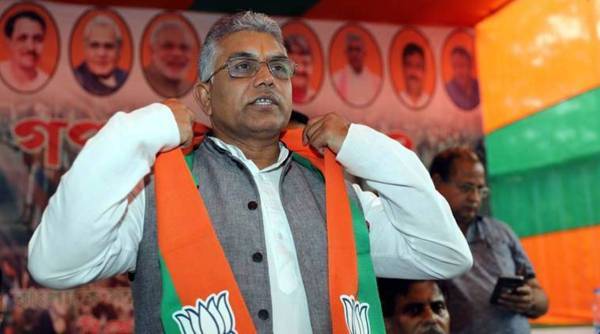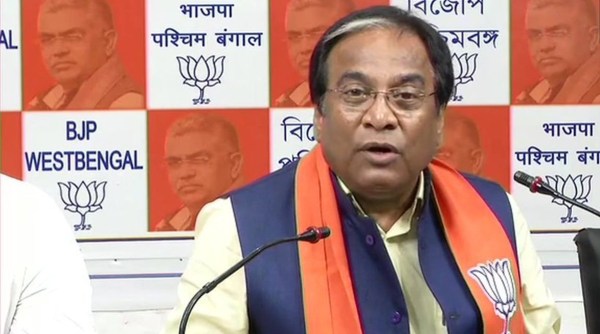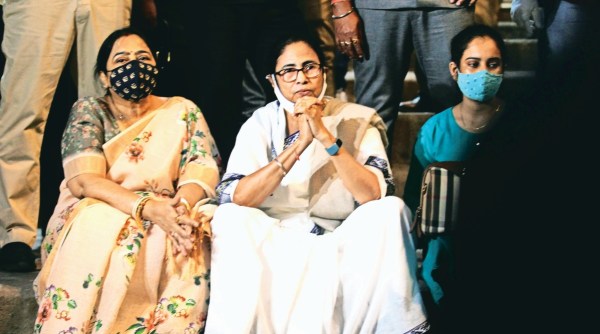The BJP is floundering in Bengal, and it is pinning its hopes for revival on Amit Shah.
The BJP expected its upswing to continue and unseat the Trinamool Congress (TMC) from power in West Bengal, where it had already established itself as the main Opposition party in the 2019 Lok Sabha elections, as the Mamata Banerjee-led party was hit by a series of defections.
But, riding on a wave of popular support for the chief minister, the TMC returned to power with a resounding mandate, and the BJP's progress in the state stalled. Factional feuds erupted, several leaders defected to the TMC, and the party lost a slew of by-elections and local-body elections.
Union Home Minister Amit Shah will arrive in the state on Wednesday for a three-day visit, his first since the state elections last year.
According to BJP sources, Shah will "discuss strategies and provide much-needed moral support to the cadre" in West Bengal, where panchayat elections will be held next year in preparation for the general elections in 2024. The home minister is expected to hold detailed discussions with state leaders and Rashtriya Swayamsevak Sangh (RSS) functionaries.
Among Shah's priorities will be instilling confidence in the party's rank-and-file, which has been on the defensive since the post-election violence last year, and putting an end to internecine battles within the state unit. "Because the party has already begun planning for the 2024 Lok Sabha elections, the central leadership cannot afford to ignore West Bengal, a state that sent 18 MPs to the Lok Sabha." His arrival was long overdue. "The state unit desperately needs morale boost, and Shah is expected to instil some confidence in the cadre," a senior BJP leader said.
The West Bengal BJP expressed "deep frustration" with the central leadership for "refusing to lend support to the cadre against the ruling Trinamool Congress's strong-arm tactics."
Leaders and employees who are dissatisfied
According to at least three party officials, the central leadership did not "pay much attention" to the West Bengal unit "after the unexpected defeat the party faced" and "the exodus of leaders who had joined the party post-Assembly elections."
"The Bengal unit has become a prayogshala (laboratory) for the BJP," a leader said. "First, Dilip Ghosh, an ideological hardliner, was tried. After that, they appointed a professor (current state BJP president Dr Sukanta Majumdar). The experiments are still going on. The main problem for the party is that we have yet to find a promising leader. We must not lose sight of the fact that this is taking place in a state where our main rival has a well-established leader."
Sukanta Majumdar's tenure as state BJP president, which began less than six months ago, has been marked by electoral and organisational setbacks. Union minister Shantanu Thakur and several district leaders were among at least ten BJP leaders who quit the party's WhatsApp groups in December in protest of their exclusion from the state committee. In response, Majumdar dissolved the state unit's departments and cells.
As more leaders met with the dissidents and expressed their dissatisfaction with the new state committee, the party expelled senior leaders Ritesh Tiwari and Joy Prakash Majumdar for publicly criticising it. Majumdar joined the TMC in March.
Thakur's protest is significant because he is a member of the Matua community, a Scheduled Caste (SC) group that helped the BJP increase its Lok Sabha tally to 18. In the 2019 elections, the party led in 26 SC-reserved Assembly segments, having won 14 such seats in the previous year's state elections. The community has been critical of the BJP-led Centre for delaying the implementation of the Citizenship Amendment Act (CAA), despite the fact that a sizable number of its members have yet to receive Indian citizenship.
Thakur and other Matua legislators in the BJP renewed their call for the law to be implemented immediately in January. Thakur presided over and attended a meeting in Thakurnagar, North 24 Parganas district (the community's headquarters).
The BJP has recently had to deal with its Barrackpore MP Arjun Singh's repeated criticism of the Centre and the Jute Commissioner over the alleged neglect of the state's jute industry. Singh told The Indian Express on April 28 that the BJP lost the elections last year due to poor candidate selection and that "many workers felt abandoned" by the party during post-election violence. "As far as I'm concerned, I'll win in 2024 regardless of the party," the MP added.
Singh was summoned to Delhi the following day after writing to Chief Minister Mamata Banerjee requesting her intervention in the issue of a price cap on raw jute.
Setbacks in the election
The saffron party's recent electoral performance reflects a lack of organisational cohesion. It has suffered a string of defeats, the most recent being in the Asansol Lok Sabha by-election and the Ballygunge Assembly by-election. In Ballygunge, the BJP finished third, trailing the Left, which increased its vote share from 5% in the 2021 elections to more than 30%.
Earlier this year, the BJP failed to win any of the state's 108 municipalities, while the CPI(M) won the Taherpur civic body in Nadia district and the newly formed Hamro Party took Darjeeling. The saffron party BJP won only 63 of the 2,171 wards in these municipalities, compared to the TMC's 1,870. The saffron party received 13% of the vote, trailing the Left's 14%. Last year, the Opposition suffered defeats in several by-elections and lost the Kolkata Municipal Corporation (KMC) election.
According to a section of the state leadership, the Centre's "soft approach" toward the Mamata government has "encouraged the TMC goons to unleash attacks on the BJP cadre." "There is a general feeling in West Bengal that the top leadership of the BJP, particularly the prime minister, is soft on Mamata Banerjee," a leader said. This motivates the TMC to oppose the BJP."
According to a section of the state leadership, the Centre's "soft approach" toward the Mamata government has "encouraged the TMC goons to unleash attacks on the BJP cadre." "There is a general feeling in West Bengal that the top leadership of the BJP, particularly the prime minister, is soft on Mamata Banerjee," a leader said. This motivates the TMC to oppose the BJP."
The state unit's dissatisfaction with the central leadership was also expressed by senior leader Kailash Vijayvargiya, the party's general secretary in charge of Bengal and a key figure in the BJP's success in the state in 2019. Vijayvargiya has sought proactive national leadership initiatives to address state leaders' complaints, but he has not visited the state since the Assembly.
"A number of issues must be addressed. Only Amit Shah can restore faith in the cadre, which is frustrated, angry, and disillusioned," a leader said.
Shah will arrive in Kolkata on the evening of May 4 and travel to Hingalganj in the North 24 Parganas district the following day to participate in a Border Security Force (BSF) programme. He will then travel to Siliguri, north Bengal, to speak at a public rally at the Railway Institute Ground. In Darjeeling, he is also expected to meet with representatives of various political and non-political organisations. On May 6, the home minister will attend a government event in Tinbigha, Cooch Behar. He will return to Kolkata that afternoon to meet with the state BJP leadership.
"The BJP is struggling to strike a balance between party veterans and newcomers," TMC spokesperson Kunal Ghosh said. "Shah is aware of his party's internal strife and its crushing defeat in Asansol by more than three lakh votes." Their candidate in Ballygunge forfeited her deposit. The state BJP leaders are now competing to see who will meet him. His visit will have no bearing."



Comments
Post a Comment